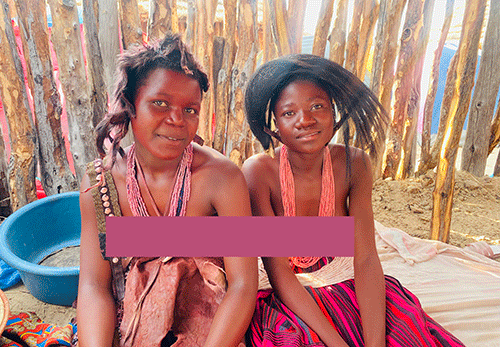OUTAPI- Over the years Olufuko has been misinterpreted to be aninitiation for young girls into marriage, when it, in fact, is a preparatory process for
the girl child to adulthood, the Oonamunganga have said.
According to them, Olufuko is an ancestral practice that teaches young girls the importance of preserving the Aawambo culture. Oonamunganga is the title given to a group or a woman (Namunganga) responsible for taking young girls through rigorous practical lectures aimed at transforming them to better individuals in accordance with the Aawambo norms and standards.
It includes, but is not limited to, making clay-stoves, pounding mahangu, working the field and how to carry themselves through their adult life. The annual cultural festival which is taking place at Outapi in the Omusati region has been loathed and lauded, almost equally. This year’s event sees 33 girls from five different traditional authorities within the region partaking from 1 to 7 July.
The festival has over the years also prepared young girls from the age of 14 on how to prepare traditional brew and how to sit as a woman.
“If the young girl happens to get pregnant without going through Olufuko, it is considered a taboo and that is why it is important for the girls to go through this initiation. We even teach the girls how to handle new-born babies and the importance of respect in marriage,” one member of the Oonamunganga said.
She further explained that the girls going through the process do not have boyfriends and if one has preparations to get married, they can go through the ceremonies and still get married. “We have school going girls partaking in the Olufuko and after the ceremonies will still go back to school and finish their education and be prominent people in the future,” Namunganga said.
“Back in the days, girls were never forced to go to Olufuko; they actually wanted to go and till today they are still not forced. The girls were only forced by their parents to marry someone they did not want (arranged marriages) because back then food was scarce,” she explained.
Speaking to New Era, one of the partaking girls explained that Olufuko is a traditional ceremony that she would love to pass on to her future children.
“I am here willingly and even if I end up getting pregnant without getting married, my parents can forgive me because I have gone through Olufuko,” she said.
The parents of the girls feel delighted that their daughters are taking part in the festival.
“I also went through Olufuko when I was young and all my daughters will go through the same process. We need to preserve our culture and teach our daughters the importance of this tradition,” said one parent.
“Our children’s marriages are breaking because they did not get the blessings of the ancestors through Olufuko, and at times are not prepared for marriage,” she said.
“It is not marriage matters which are taught here but mostly issues pertaining to adult life; there is no man here looking for a wife,” said Botho University student, Victoria Lilemba, who is carrying out research to compare Namibia’s Olufuko to Zambia’s Cikenge initiation rite.
During her research, she found out that only virgins take part in the Olufuko and no pregnant girls or girls with children take part in the ceremony.
“They are not marrying but just being prepared for adulthood. In the preparation, they learn a lot of skills and these skills contribute to the girl child’s education. Traditional rituals are practised every day,” explained Lilemba.


